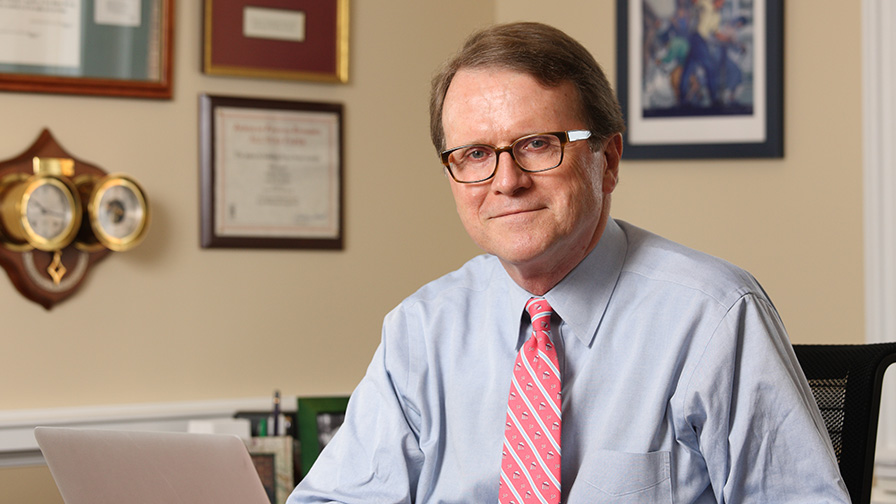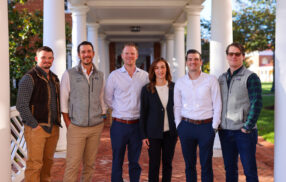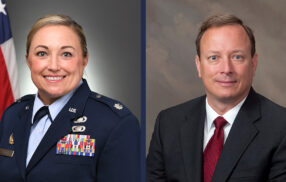
Presidential Leadership and the Practice of ‘Realistic Optimism’
By Dave Hendrick
Does a positive outlook, or at least the veneer of one, benefit a leader? Should optimism and warmth be considered an important part of the effective leader’s toolkit? And when it comes to the biggest stage — the Office of the President of the United States — does optimism correlate with historical perceptions of effectiveness?
University of Virginia Darden School of Business Professor and Dean Emeritus Bob Bruner recently tackled these questions and more during a presentation for Darden alumni, sharing his research into the leadership lessons we might draw from the optimism — or lack thereof — of U.S. Presidents. Among other projects, Bruner is studying and teaching about the leadership lessons of the Presidents.
The 44 presidents represent compelling case studies in leadership traits, as they have passed through a “demanding gauntlet” to achieve their rank and were elected at least in part because a large portion of the electorate believed they would make good leaders, Bruner said.
Using the presidents’ own self-narratives as the basis for much of his research, Bruner said the sentiment analysis of the post-World War II presidents showed:
- Presidents express stronger sentiments of optimism than appear in benchmark contemporaneous documents such as newspapers, books and movie scripts.
- Presidents are not uniform in their expression of optimism, which varies widely based on their own life experience and the context of their time in office.
- There is no association between optimism and the ranking by historians, which is one measurement of presidential legacy.
The generally optimistic sentiments may be a key ingredient in presidential influence, motivating both self and others, Bruner said.
At the same time, biographies and contemporary observers suggest that the public optimism of presidents hid private doubts and worries. If so, are presidents being “authentic,” a trait that people say they most desire in their leaders?
“Perhaps presidential optimism is a different kind of authenticity: fidelity to the leadership necessary to sustain the nation’s values and mission,” Bruner said.
This kind of “optimistic authenticity” was effectively demonstrated by Presidents Harry Truman and Dwight Eisenhower during the Cold War, by President Gerald Ford in the aftermath of Watergate, and virtually all others. Authenticity to the self can be a trap for leaders, but authenticity on behalf of the challenges and opportunities of the group is vitally important.
There can be downsides to the trait, Bruner said. A cognitive bias toward optimism can lead to “risky behavior.” And a culture of optimism might discourage debates or the delivery of bad news.
Bruner said most can agree that presidents — along with medics, pilots and people who operate nuclear power plants — should not be so optimistic as to be poorly attuned to potential danger, for instance. He suggested that “realistic optimism” is the appropriate middle ground for a leader — able to set an optimistic tone while “owning the bad news” and not inflating good news.
“Optimism is an instrument for leadership,” Bruner said, noting his own experience attempting realistic optimism during the depths of the financial crisis while serving as Darden dean. “Optimism motivates, pessimism demotivates.”
Given the current political backdrop for Bruner’s presentation, the professor was not surprisingly peppered with questions about President Donald Trump, whose campaign pronouncements and inaugural addresses carried dire warnings about the state of the country and the world alongside his promise to “Make America Great Again.”
Bruner, however, was not yet ready to make judgments on how Trump would fit into his research narrative or be judged by historians, given the early days of the new administration. He pointed, however, to the commentary he published in Fortune in the waning days of the election, noting that Americans want to be led by an optimist.
Said Bruner, “Trump will be a focus of deep study for all of us who study leaders and presidents, and I think there is more data to come.”
The University of Virginia Darden School of Business prepares responsible global leaders through unparalleled transformational learning experiences. Darden’s graduate degree programs (MBA, MSBA and Ph.D.) and Executive Education & Lifelong Learning programs offered by the Darden School Foundation set the stage for a lifetime of career advancement and impact. Darden’s top-ranked faculty, renowned for teaching excellence, inspires and shapes modern business leadership worldwide through research, thought leadership and business publishing. Darden has Grounds in Charlottesville, Virginia, and the Washington, D.C., area and a global community that includes 18,000 alumni in 90 countries. Darden was established in 1955 at the University of Virginia, a top public university founded by Thomas Jefferson in 1819 in Charlottesville, Virginia.
Press Contact
Molly Mitchell
Senior Associate Director, Editorial and Media Relations
Darden School of Business
University of Virginia
MitchellM@darden.virginia.edu




